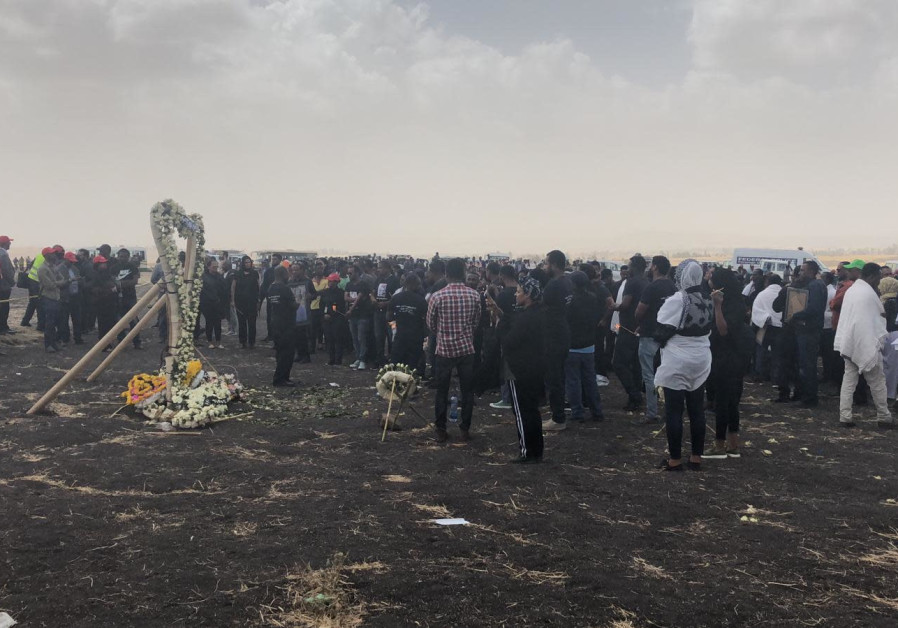Shock Waves and Incompetence
"We need the remains of our children."
"And they are saying that it can take six months or more."
Ibrahim Mohammed, Kenya
"We came here for nothing."
"They told us the bodies were small pieces, more than 5,000 pieces."
Nejmedin Gazi, Yemen
"We were expecting that we will have our body well-kept but we are amazed to hear that there is nothing, totally nothing."
Pauline Gathu, Kenya
"Break, break, request back to home."
Captain, Ethiopian Airlines Flight 302
 |
| People walk past a part of the wreckage at the scene of the Ethiopian Airlines Flight ET 302 plane crash, near the town of Bishoftu, southeast of Addis Ababa, Ethiopia March 10, 2019. (photo credit: TIKSA NEGERI / REUTERS) |
Now investigators in France are faced with decoding the black boxes recovered from that crash. A crash that experts have described as descending at full speed, nose down, directly into the ground, completely disintegrating, buried in the receiving landscape, no one aboard left intact, all 157 people aboard -- passengers and crew -- dead on contact. French authorities won't comment whether they will be able to retrieve much from the flight data and voice recording.
All the countries that have grounded the Boeing 737 Max 8 in their national fleets are aware that Boeing must now face the dire necessity of providing proof their jets are safe to fly while suspicions revolve around faulty software that appears contributed to the Ethiopian Air crash and a previous fall of 2018 crash with similar outlines and deadly force flown by Indonesia's Lion Air Flight 610, whose crash killed 189 people off Indonesia.
Among the victims of the Ethiopian Air crash were representatives of 35 countries, including 21 United Nations staffers. In both instances, each of the planes exhibited erratic altitude changes as they were airborne, leaving the impression with flight investigating experts that the pilots had struggled in an effort to control their aircraft. And in both instances crews attempted to return to the airport from which they had just taken off.
Regulators, according to the U.S. Federal Aviation Administration, are in possession of new data from satellite-based tracking indicating the movements of both planes were similar. Boeing reiterates "full confidence" in their planes' safety; that their engineers are changing the software system designed to prevent an aerodynamic stall should sensors detect the jet's nose is pointed too high and its speed too low.
This, however, appears to be the problem; that both captains and crews were unable to override the software that kept pointing their aircraft's nose too low, and accelerating its speed to an uncomfortable degree. Leading investigators to focus on whether the software automatically pushed the plane's nose repeatedly downward; whether the Lion Air pilots had the learned skills to resolve the problem, where Ethiopian Airlines claim its pilots had special training on the software.
Israel's ZAKA emergency response team is on site, granted access to enable them to perform the work the dedicated volunteers know best; forensic examinations to the most minute details to achieve closure. Following which discussions related to repatriating whatever remains of the victims could commence in the wake of identification.
"We never encountered such a difficult situation. I was at the scene together with ZAKA volunteers."
Azriel Schnitzer, commander, ZAKA delegation, Ethiopia
"The great fear is that, God forbid, there will not be a situation where, when they made the scientific identification .... they will not find the bodies of the two Israelis who perished in the plane."
"At the Sakala Hotel, Ethiopian Airlines began arriving dozens of families of bereaved families from around the world who wanted to receive answers and information about the fate of their loved ones, but there was no one to explain to them what was happening or to answer their questions. You can not describe the cries and shouts of the families who [came from] far away, the ambassadors of the countries are walking around the hotel without the ability to help the families because the Ethiopians are not cooperating with them to ... their astonishment."
ZAKA chairman Yehuda Meshi-Zahav
"It's a hard feeling to get to the ring when we see the many findings rolling around without being able to provide a proper and professional response. Within a day, all the parts of the plane disappeared from the arena to an unknown location without [our] being able to check the possibility of findings within the parts of the plane. The feeling is painful and very difficult."
Eliezer Samet, ZAKA volunteer, Ethiopia
 |
| (photo credit: TIKSA NEGERI / REUTERS) |
Labels: Air Disaster, Boeing, Ethiopia

0 Comments:
Post a Comment
<< Home